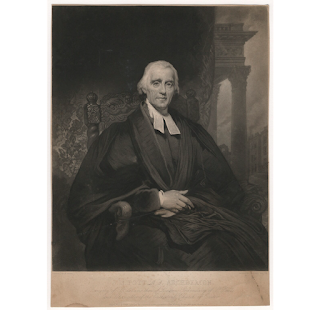"The nature of that future happiness": A Hackney Phalanx sermon for the Sunday after Ascension
From A Course of Sermons, for the Lord's Day throughout the Year, Volume II (1817) by Joseph Holden Pott - associated with the Hackney Phalanx - an extract from a sermon for the Sunday after Ascension. Pott, reflecting an Old High spirituality which fostered gratitude for the ordinary blessings of earthly life and was deeply suspicious of an excessively ascetical discipline, points to earthly joys as an anticipation of heavenly delight:
Our Lord's ascension into heaven, so newly celebrated in the Church, inclines us very naturally to direct the thoughts to that scene of glory into which he entered, and to which he hath promised to receive his faithful servants, who shall aspire to those everlasting realms of light and bliss ...
Surely it is most injurious to the character of Christian hope, as it exists here, to say that its consolations and fruitions are fit only for those who have no worldly pleasures to engage their notice and attention, and no present satisfactions to refresh their senses. It is chiefly through the force of this gross misconception, that it proves a grievous thing to some men to think at all of any other kind of phrase, or of any better scene of things, than that which is present to them in this term of life ...
The pleasures of rational society, the kindness of those who are knit to us in the bonds of near affection, these are things which we know well how to prise, and indeed we prise them justly. Do these grounds of present happiness, the best which belong to us on this side the grave, supply no arguments, and yield no evidence, of the nature of that future happiness, which we so eagerly desire to understand?
... without laying more stress than may be fitting on such things as the subjects of a future hope, by which means we might perhaps be led to frame narrower schemes of happiness than those which God designs for us; yet where the reasonable soul receives and entertains impressions which far exceed the present purpose of advantage, as it does from virtuous affections, we may well believe that this ground of moral happiness will survive.




Comments
Post a Comment